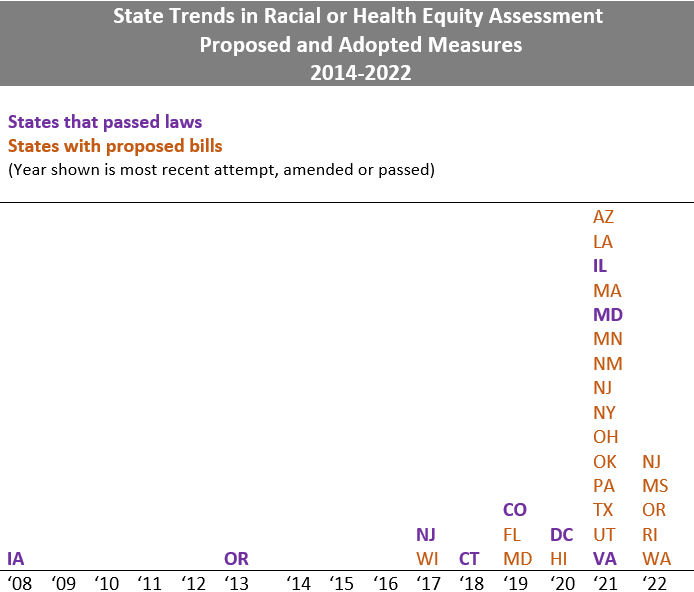Legislative Trends in Health and Racial Equity, 2021-2022
December 9, 2022
Overview
Creating a government that is truly for everyone requires laws and policies that eliminate racial and ethnic disparities and improve outcomes for all. As 2023 state legislative sessions approach, it is important to look back at trends over the last few years in legislation impacting health and racial equity to understand how states are trying to address the health impacts of racism, be accountable for commitments to address racism as a public health crisis, and ensure the conditions for all people to thrive. State legislation is one important mechanism for creating the infrastructure for healthy communities. We assessed legislation for the past two years, looking at 447 bills. Below, we discuss two important trends.

Creating a government that is truly for everyone requires laws and policies that eliminate racial and ethnic disparities and improve outcomes for all. As 2023 state legislative sessions approach, it is important to look back at trends over the last few years in legislation impacting health and racial equity to understand how states are trying to address the health impacts of racism, be accountable for commitments to address racism as a public health crisis, and ensure the conditions for all people to thrive. State legislation is one important mechanism for creating the infrastructure for healthy communities. We assessed legislation for the past two years, looking at 447 bills. Below, we discuss two important trends.
Cultural Competency and Implicit Bias Requirements
One pathway to addressing structural racism in healthcare is through reducing the effects of implicit bias in the healthcare system and ensuring culturally appropriate service provision. To that end, states have proposed or enacted legislation that would mandate incorporation of the National CLAS Standards specifically or cultural competency generally in medical education or training or as part of the licensure or renewal process (including continuing education requirements). Ten states have these requirements currently: Arizona, California, Connecticut, Illinois, Indiana, Nevada, New Jersey, New Mexico, Oregon, and Washington, but they may only apply to certain workers, like behavioral health professionals (Arizona, Indiana) and public health dental hygienists (Illinois).
Some states have recently enacted or proposed legislation specifically requiring implicit bias training. For example, California enacted AB 1407 (2021) that requires nursing schools and programs to include implicit bias training as a requirement for graduation, requires licensees within the first two years of holding their license to complete implicit bias training, and requires hospitals to implement evidence-based implicit bias training programs as part of their programs that hire and train new nursing program graduates. Illinois enacted HB0158 (2021) requiring health care professionals to complete implicit bias awareness training as part of their required continuing medical education. Another 16 states proposed similar legislation in 2021 or 2022. States have also introduced or enacted bills to require implicit bias training in other, non-health care sectors, including criminal justice, legislative services, law enforcement, real estate, and for staff like law enforcement or peace officers, legislators, child protective services employees, school resource officers, foster parents, or state employees generally.
Racial Equity Impact Assessments
For more than a decade one tool that has grown in popularity is racial equity impact assessments (REIAs), designed to “bake” racial equity into the state legislative and policymaking process. Bills introducing racial equity assessments for certain legislation have been proposed in over two dozen states since 2007, but only nine states and the District of Columbia have passed laws implementing REIA processes or pilot projects. Cumulatively, criminal justice bills are the focus for both proposed and passed legislation. However, an increasing number of bills since 2019 have proposed a broader topical scope. One example is from Colorado, which passed HB19-1184 (2019), requiring Colorado Legislative Council Staff to prepare demographic analyses for up to 20 bills each year. Each demographic note outlines a bill’s potential effects on disparities within the state, and is available publicly on the Legislative Council Staff’s website. To date, seven notes have been completed across three sessions. A second example is Rhode Island’s H 7736 (2022) which would have “require[d] the members of the General Assembly to provide race, ethnicity and gender impact statements in conjunction with all proposed legislation.” This bill did not pass and was recommended for further study by the House State Government and Elections committee in April 2022.

Looking forward
There are several other trends in health and racial equity legislation including improving early childhood development and education, data collection and use, and equity in birth outcomes, among other things. We discussed these trends in more detail during a webinar hosted by the New England Public Health Training Center on July 22, 2022. The recent midterm elections are a reminder that soon after, state legislatures will be in full swing (see the 2023 calendar for dates in your state) and legislators new and old will be introducing and voting on a number of bills that impact our lives and wellbeing in significant ways. Being aware of these trends helps us to be better engaged in advocating for laws and policies that will reduce disparities and change systems to create the conditions for better individual and community health.
This post was written by Dawn Hunter J.D., MPH, Director, and Sara Rogers, MPH, Public Health Policy Analyst, Network for Public Health Law—Southeastern Region Office, with research support from Haley Campbell Garcia, JD Candidate University of Kentucky J. David Rosenberg College of Law 2024.
The Network for Public Health Law provides information and technical assistance on issues related to public health. The legal information and assistance provided in this document do not constitute legal advice or legal representation. For legal advice, readers should consult a lawyer in their state.
Support for the Network is provided by the Robert Wood Johnson Foundation (RWJF). The views expressed in this post do not represent the views of (and should not be attributed to) RWJF.
